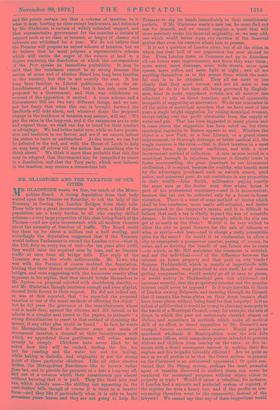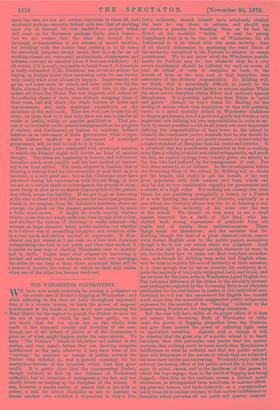MR. GLADSTONE AND THE TAXATION OF OUR CITIES.
j[R. GLADSTONE wants, we fear, too much of the Metro- .111 politan Board. A strong deputation from that body waited upon the Premier on Saturday, to ask the help of the Treasury in freeing the London Bridges from their tolls. These tolls are a great inconvenience to about a third of the population, are a heavy burden to all who employ skilled artisans—a very large proportion of this class living South of the Thames—and are quite inconsistent with all modern theories about the necessity of freedom of traffic. The Board could buy them up for about a million and a half sterling, and accordingly the deputation suggested that if the Treasury would induce Parliament to extend the London octroi—that is, the 13d: duty on every ton of coal—for ten years after 1889, they would raise the required sum by loan, and so liberate traffic at once from all bridge tolls. The reply of the Treasury was on the whole unfavourable. Mr. Lowe, who was with the Premier, of course snubbed the deputation, hinting that their distant constituents did not care about the bridges, and even suggesting-with the humorous cruelty often apparent in his replies, that they should betake themselves to Mr. Ayrton—a proposal rejected with shuddering alacrity,— and Mr. Gladstone, though courteous enough and even playful, showed little favour to their request. He did not indeed say, as was at first reported, that "he regarded the proposed taxation as one of the worst methods of effecting the object "; but he did press the grievance of the manufacturers, whose coal is made dear, against the citizens, and did intend, as he admits in a circular sent round to the papers, to intimate "a strong disinclination to resort to that method of obtaining the money, if any other plan could be found." In fact, he wants the Metropolitan Board to discover some new mode of intramural taxation, a demand on their inventiveness with which we apprehend those gentlemen will refuse unani- mously to comply. Chickens have never liked to be asked how they will be cooked, feeling the fire too hot for roasting and the water too wet for boiling, while baking is diabolic, and originality is not the strong point of these particular chickens. Like all other elective bodies, the Metropolitan Boardsmen like to borrow rather ,Than tax, and to provide for payment at a date a long way off, and out of a revenue which their constituents pay almost without knowing that it is paid. They like their nice coal tax, which nobody sees—the shilling not appearing in the coal-dealers' bills, though of course it is there in a heavier form—and they like it particularly when it is only to begin seventeen years hence, and they are not going to help the Treasury to dip its hands immediately in their constituents' pockets. If Mr. Gladstone wants a new tax, he must find out one for himself, and we cannot imagine a quest that will more seriously strain his financial originality, or, we may add, one which would better repay any exertion of the financial genius that even his enemies admit him to possess.
It is not a question of London alone, but of all the cities, in which one clear half of our population has now elected to live. From London down to Penzance and up to Aberdeen all our towns want improvements, and know they want them ; more water, more drainage, more wide streets, more open spaces, more police, and more light at night ; and all are puzzling themselves as to the source from which the need- ful cash is to be obtained. They all see more or less clearly that they must borrow, and are all more or less willing to do it ; but they all, being governed by English- men, want to make repayment certain, are all more or leas reluctant to rely on direct taxation, and are all apparently incapable of suggesting an alternative. We do not remember in all the miles of municipal speeches that we have read of late years a single bright suggestion for raising municipal revenue, except taking over the profit obtainable from the supply of water and gas. That has been suggested in many places, and in some places the suggestion has been acted on, but there municipal ingenuity in finance appears to end. Whether the object is a new Park, or a free Library, or a grand street improvement, or thorough drainage, or better medical aid, the single resource is the rates,—that is, direct taxation in a most injurious form, upon unjust conditions, and with a most inconvenient method of collection. A rate as now levied in a municipal borough is injurious, because it directly tends to foster overcrowding, the great drawback to our intramural civilisation; it is unjust, because the wealthy, who benefit most by the advantages purchased, such as smooth streets, good police, and quiescent poor, do not contribute in any proportion to their wealth—John Smith, millionaire, paying exactly the same sum as the doctor next door whose house is part of his professional machinery—and it is inconvenient, because the tax can be collected only by a house-to-house visitation. There is a want of some method of taxing which shall be less cumbrous, more easily self-adjusted, and better proportioned to the taxpayer's means, and it is difficult to believe that such a tax is wholly beyond the ken of scientific finance. Is there no luxury, for example, which the city can get at as easily as the State ? Would it be very wicked to allow the city to grant licences for the sale of tobacco, or wine, or spirits—not beer—and to charge a really perceptible price for the same ? Or would it be confiscation to allow a city to expropriate a prosperous quarter, paying, of course, its value, and so deriving the benefit of any future rise in rents —to which, as Mr. Mill maintains, the commune is entitled, and not the individual—and of the difference between the interest on house property and that paid on city bonds ? Suppose Huddersfield, which is usually at loggerheads with Sir John Ramsden, were permitted to own itself, he of course getting compensation, would society go all at once to pieces, or would society in Huddersfield gain this additional and immense security, that the proprietary interest and the popular interest could never be opposed ? Is it truly horrible to think of London owning Belgravia, and insisting through its Council that if tenants like brass-plates on their doors tenants shall have brass-plates without being fined for that iniquity? Is it an axiom of polities that it would be wrong to place any monopoly in the hands of a Municipal Council,—say, for example, the sale of drugs, in which the poor are notoriously cheated, almost ad 4" libitum, and sometimes in methods which make all medical skill of no effect, in direct opposition to Mr. Disraeli's new evangel, Sanitas sanitatum, omnia sanitas? Would people be murdered wholesale if Municipalities were the sole Life Assurance Offices, with compulsory powers intended to prevent widows and children from coming on the rates ; or fire in- surers with a direct consequent interest in making their fire engines and fire brigades tolerably efficient ? Are we quite an sure as we all profess to be that the Octroi system so general on the Continent is an antiquated oppression ? Or quite con- vinced that the Stamp system, perhaps the most powerful agent of taxation discoverd in modern times, can never be employed for municipal purposes without injury either to property or trade ? Would it cause a rebellion, for instance, if London had a separate and perfected system of registry, if the registry fee were a heavy one, and if the profits on con- veyancing therefore went to the community, instead of the lawyers ? We cannot say that any of these suggestions would
meet the case, we can see serious objections to them all, and we should perhaps earnestly defend only one, that of enabling each city to become its own landlord—a project which will come up for discussion perhaps thirty years hence— but we are certain that the time has arrived for a thorough re-examination of our scheme of mural taxation, for breaking with the notion that nothing is to be taxed for municipal purposes except rental, that is,—as far as all working-classes are concerned, professionals, shopkeepers, and artisans,—except an essential piece of business machinery. At all events, if it is really impossible to break from it, if invention is really exhausted, if Mr. Gladstone can devise no scheme for buying up bridges better than increasing rates, we can foresee very clearly what must ultimately happen. Improvement will go on, and loans must be risked, and rates must rise till the State, alarmed by the cry from below, will turn to the pre- cedent set when the House Tax was imposed, will relieve all the suffering classes of their rates without stripping them of their votes, and will throw the whole burden of debts, and improvements, and daily municipal expenditure on the shoulders of the well-to-do. They are even now to pay for all wars ; let them look to it that they have not also to pay for all works of health, utility, or popular gratification. That pro- cess is as inevitable under present arrangements as the progress of society, and Parliament, so jealous to maintain indirect taxation as an instrument of State government, while it repu- diates indirect taxation as an instrument of municipal government, will do well to look to it in time.
There is another point connected with municipal taxation to which the Premier might well devote an hour of anxious thought, The cities are beginning to borrow, and will borrow
hereafter much more rapidly, and the best method of borrow- ing is far from settled. The mode adopted in London, that of
forming a sinking fund for the extinction of each debt as it is incurred, is a very good one ; but as Mr. Gladstone must have perceived during his conversation with Colonel Hogg, it does not act as a serious check on extravagance, the process of repay-
ment being so slow as to be almost imperceptible to the genera- tion which incurs the liability. If we are to go on borrowing
at the rate of about £10,000,000 a year for municipal purposes, which is, we imagine, from Mr. Goschen's statistics, about our average, the pinch on the present generation should be made a trifle more severe. It might be worth inquiry whether twenty years was not amply sufficient time for any debt to last, and whether the system of drawings is really immoral—the average on large amounts being pretty uniform—or whether it is a clever way of reconciling taxpayers and creditors alike to a very quick and certain method of repayment. If Man- chester can get money at 3 per cent. on a loan with drawings extinguishing the debt in ten years, and likes that method, it is surely an easy way of binding Manchester over to honesty and to thrift. Unless some clear scheme for borrowing is devised and enforced, some scheme which will not mortgage the cities for too long a time, these municipal debts will be a source of trouble, the extent of which we shall only realise when one of the cities has become insolvent.



































 Previous page
Previous page